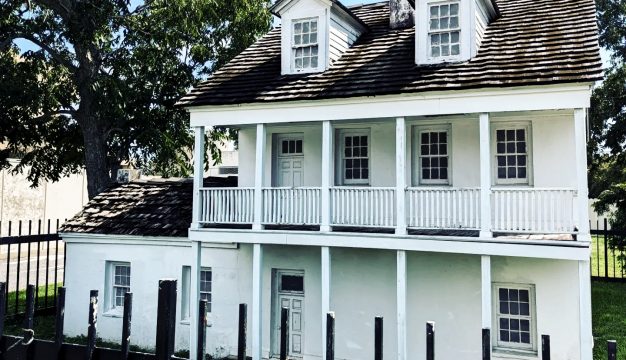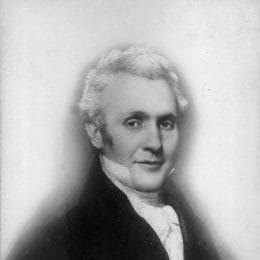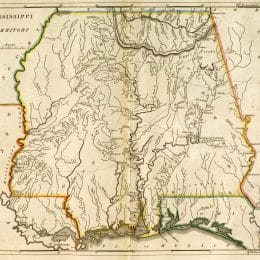Charles Lefebvre-Desnouettes
Charles Lefebvre-Desnouettes (1773-1821) was one of the leading founders of the Vine and Olive Colony, which was established in 1817 near present-day Demopolis, Marengo County. A professional soldier who had led various regiments during the French Revolution and the Napoleonic Wars in the late eighteenth and early nineteenth centuries, Lefebvre-Desnouettes was renowned for his loyalty to his commander and political leader, Napoleon Bonaparte. He was banned from Europe and sentenced to death by French monarchists following the French defeat at Waterloo, Belgium, for aiding Napoleon after his first exile. Lefebvre-Desnouettes fled France for the United States and settled in what was then the Alabama Territory (present-day Alabama) in 1817. He was perhaps the central figure in the mythology about the colony that it was populated with exiled aristocratic supporters of Bonaparte, commonly known as Bonapartists, when in fact, he was the only military officer and nobleman.
Lefebvre-Desnouettes (Da noo et) was born on September 14, 1773, in Paris into the middle class, or bourgeoisie. His father, Jean-Claude Lefebvre, was a drapery merchant and supplier to the French Army, to which the young Charles eagerly anticipated giving his service. In 1789, he joined the National Guard of Paris, and in 1792, he enlisted in the French Revolutionary Army. Lefebvre-Desnouettes would have several other military deployments and promotions during the French Revolutionary Wars. He was promoted to lieutenant and then deployed with the Army of Italy, a field army of the French Army stationed on the Italian border, in 1797. It was most likely at this duty station that Lefebvre-Desnouettes first met Napoleon Bonaparte, as it was one of Napoleon’s early commands. Lefebvre-Desnouettes continued to impress his superiors and rose in rank quickly. In the following year, he was promoted to captain and deployed to Belgium, which France had annexed in 1795.
In 1800, Lefebvre-Desnouettes became an aide-de-camp to Napoleon and according to some sources, fought in the successful Battle of Marengo (for which Marengo County is named), earning him a promotion to squadron leader (chef d’escadrons). Between 1802 and 1805, Lefebvre-Desnouettes served in several more units and battles as Napoleon consolidated his power, becoming emperor in 1804. There are some sources that say Lefebvre-Desnouettes was present at Napoleon’s most famous victory, the Battle of Austerlitz, before being made a commander of the Legion of Honor on Christmas Day in 1805.
In the following years, Lefebvre-Desnouettes’ exceptional military career would continue, with Napoleon promoting him in 1806 to brigade general (général de brigade) in command of a brigade of Bavarian cavalry. Also that year, Lefebvre-Desnouettes married Napoleon’s cousin Louise Stéphanie Rollier. The couple would have a daughter. He was promoted to division general (général-de-division) in December 1807, and Napoleon gifted his new general with a house in Paris. He continued to rise in the ranks as a very capable military leader, until December 1808, when the tide began to turn against the French in Spain.
In January 1808, Lefebvre-Desnouettes became major-colonel of the cavalry (chasseurs à cheval) of the Imperial Guard. Soon after, he was named a Count of the Empire and then received a command of the Corps of Observation of the Western Pyrenees and participated in the Peninsular War, Napoleon’s failed attempt to conquer Portugal and Spain. Lefebvre-Desnouettes played prominent roles in several victories, and he was in initial command of French forces during the Siege of Saragossa. But he was wounded during the failed attempt to take the Spanish city. (The first governor of Spanish West Florida, José Manuel de Ezpeleta y Galdeano, was imprisoned during this campaign for opposing the French occupation.)
Lefebvre-Desnouettes returned to France and was promoted to division general (général de division) and placed in command of the mounted chasseurs of the Imperial Guard. He returned with them to again fight in Spain. While pursuing the British at Beneavente, in Zamora, Spain, Lefebvre-Desnouettes found the Elsa River bridge destroyed and decided to cross the river with his four squadrons of chasseurs. In a suspected ambush, the chasseurs defeated a small regiment only to be eventually met by a much larger, reinforced regiment, which eventually forced Lefebvre-Desnouettes and his men to retreat. Lefebvre-Desnouettes was wounded and his horse injured, thus leaving him with no way to escape. He was captured on December 29, 1808, and held as a prisoner in England, earning the scorn of Napoleon, who disagreed with his decision to cross the river. Aided by his wife, who was allowed to live with him in England, Lefebvre-Desnouettes escaped to France in May 1812.
Napoleon reinstated Lefebvre-Desnouettes in his official post, from which he led his troops into battle in the failed Russian campaign, during which he was wounded, as well as in multiple battles in Germany in 1813. Suffering defeats and facing a much larger coalition of forces, Napoleon abdicated his throne in 1814 and was exiled to the island of Elba. Lefebvre-Desnouettes made several failed attempts to aid Napoleon with military support. He eventually rejoined Napoleon during the period known as “The One Hundred Days,” when Napoleon aimed to retake the French throne. Napoleon’s efforts ended with his final defeat at the June 1815 Battle of Waterloo, in which Lefebvre-Desnouettes led some cavalry in repeated charges and was captured. After Napoleon’s abdication, Lefebvre-Desnouettes was banned from France and sentenced to death.
Vine and Olive Colony
Once again Lefebvre-Desnouettes would make a daring escape. Disguised as a merchant, he boarded a ship to the United States in 1815. In Philadelphia, Pennsylvania, Lefebvre-Desnouettes and others loyal to Napoleon, along with a much larger group of French planters who had fled a slave revolt in present-day Haiti, became a part of the Colonial Society (later renamed the Society for the Cultivation of the Vine and Olive). Lefebvre-Desnouettes would serve as its president for a short time. The group was granted 92,000 acres in what is now west-central Alabama and following an advance party to survey the grant, Lefebvre-Desnouettes left Philadelphia with a larger party for Mobile in August 1817.
Lefebvre-Desnouettes and some other colony leaders sought the assistance of U.S. Indian agent George Strother Gaines at his Choctaw Trading House on the Tombigbee River about where to locate the colony. Gaines suggested a location below the confluence of the Black Warrior and Tombigbee Rivers, known as “White Bluff” in present-day Demopolis. That locale was later found to be outside the land grant, which was a mile to the east, and the colonists were forced to move. They named one new settlement Aigleville, or “Eagleville,” and another Arcola. The move prompted disputes between some colonists, including Lefebvre-Desnouettes, who had been granted an allotment of 480 acres and wanted to exchange it for a more valuable parcel closer to Aigleville. He accomplished this by legally evicting several colonists, moving them to his allotment, and occupying their land. Through this and other maneuvers, he was able to acquire more than 2,000 acres. He would construct two log cabins, one for his home.
Gaines, in his Reminiscences of Early Times in the Mississippi Territory, notes that the second cabin was used for entertaining and in it, Lefebvre-Desnouettes kept a bronze bust of Napoleon, imperial flags, and weapons. During an early visit to Lefebvre-Desnouettes, Gaines relates that they dined on food cooked in the “French style” and enjoyed French brandy and French wine, which Lefebvre-Desnouettes also supplied to Gaines. He mentions a silver traveling case and other pieces of silver, which he was told were gifts from Napoleon. Gaines helped supply the colonists with trade goods and also sold Lefebvre-Desnouettes two oxen. In 1819, Gaines, Lefebvre-Desnouettes, and several businessmen from St. Stephens formed the “White Bluff Association” to promote the development of Demopolis. In addition to farming, he also owned a general store, but it was poorly managed by another colonist, lost money, and was sold off.
Farm life in the American south was unsuitable and unsatisfying for the decorated military officer who built his reputation fighting for France. Lefebvre-Desnouettes reveals his anguish in a November 1, 1821, letter to Jean-Guillaume, Baron Hyde de Neuville, the French ambassador to the United States. In it, he relates that the experience working his fields in the heat sapped his strength and mental well-being and left him lonely and depressed. Overall, he expresses his desire to end his exile and return to France and die in his native land.
With the assistance of his wife, who was in Belgium and had reportedly sent him large sums of money on occasion, Lefebvre-Desnouette was granted a partial pardon and allowed to return to Europe. He boarded the passenger ship Albion to Liverpool, England, and died when the ship sank in a storm off the coast of Kinsale, Ireland, in 1822. His wife had a mausoleum constructed for him in Sainte Adresse, Normandy, France. He is remembered in Demopolis with a short stretch of street named “North Desnouettes Avenue” and an historic marker erected in 1967 by the Alabama Historical Association at the intersection of U.S. 80 and Old Springhill Road. In addition, the Demopolis Times has published many stories about him and the colony over the decades. It was discovered in the early 2020s that he was buried in Templetrine Cemetery in Ballinspittle, Ireland, and was honored with a plaque in Kinsale in 2022.
Further Reading
- Blaufarb, Rafe. Bonapartists in the Borderlands: French Exiles and Refugees on the Gulf Coast, 1815-1835. Tuscaloosa: University of Alabama Press, 2005.
- ———. “Notes and Documents: French Consular Reports on the Association of French Emigrants: The Organization of the Vine and Olive Colony.” Alabama Review 56 (April 2003): 104-24.
- Pate, James P., ed. The Reminiscences of George Strother Gaines: Pioneer and Statesman of Early Alabama and Mississippi, 1805-1843. Tuscaloosa: University of Alabama Press, 1998.
- Saugera, Eric. Reborn in America: French Exiles and Refugees in the United States and the Vine and Olive Adventure, 1815-1865. Tuscaloosa: University of Alabama Press, 2011.
- Selin, Shannon. Napoleon in America. Canada: Dry Wall Publishing, 2014.
- Smith, Winston. Days of Exile: The Story of the Vine and Olive Colony in Alabama. Tuscaloosa, Ala.: W.B. Drake and Sons, 1967.















